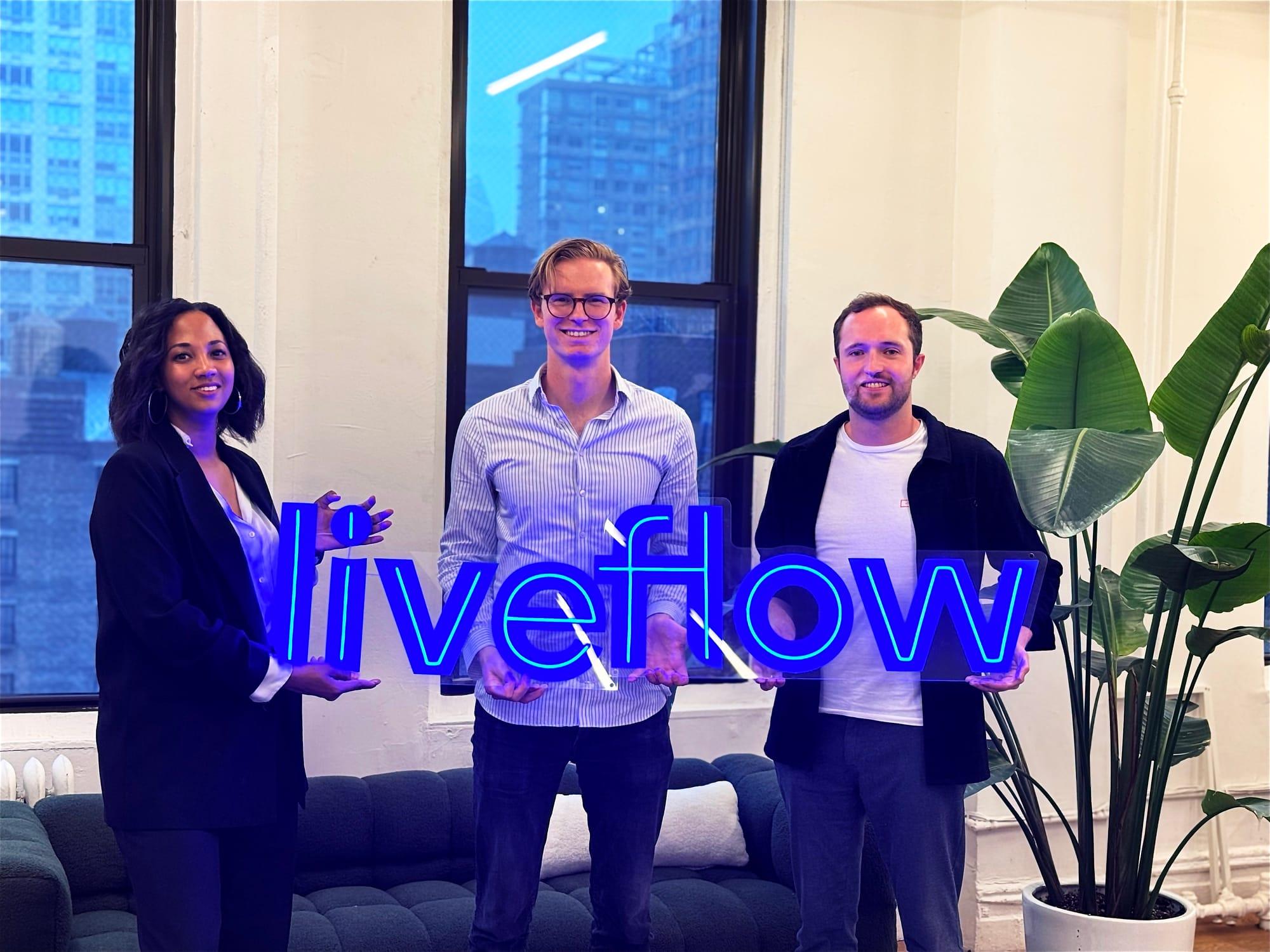Portfolio-04/04/2024
Meet LiveFlow: Revolutionising Financial Reporting
'Way too much time is being spent setting up models and tinkering with spreadsheets. Not enough time is being spent on strategic analysis. The industry is ready for a shift.’

LiveFlow’s founders, Lasse Kalkar, Anita Koimur, and Evan O'Brien embody the best of the post-COVID generation of entrepreneurs. Ambition and hustle meet the belief that geography is no longer an obstacle. The mission is simply to serve your customer, wherever they are. Creating value is all that matters.
We first met during their time at Y Combinator, and I could tell then that they had the vision and drive to build a global business. I caught up with Lasse to talk about the early days, our work together, and what the future looks like.
An untapped opportunity
Accounting software’s ‘big change’ hasn’t happened yet. The top tier players are now 20 to 30 years old, and their infrastructure hasn’t evolved much over that timeframe.
If we look at similar categories, the rate of innovation is striking. The HR stack used to run on outdated systems like ADP and Paychex, but now we’re seeing the likes of Humaans, Gusto, and Rippling take market share. In credit cards and expense management, Amex and bank-run programs were the only shows in town, but now Brex and Ramp are upending things.
And accounting? Waves of innovation seem to have passed it by and so old school software still dominates.
The upshot is that very little attention has been paid to the needs of the end user, especially those at the small and midsize business (SMB) end of the market. Ultimately, this means accounting teams are underserved: their tools get them bogged down in mental-manual tasks so that they’re unable to focus on pulling insight from the deluge of data they have to wrestle with. Naturally, this creates an opportunity.
As Lasse puts it, ‘People are realising that finance is a function that is still executed very manually. Way too much time is being spent setting up models and tinkering with spreadsheets. Not enough time is being spent on strategic analysis. The industry is ready for a shift.’
Creating magic for the user
I like to think of what LiveFlow does as creating magic for the end user. By automating the updating of financial information, consolidating it all in one place, and making it instantly accessible across the business, they are freeing accounting teams from laborious mental-manual tasks. On average, each accountant saves 192 hours per year. That’s the equivalent of four to five working weeks in the US. As improvements to operational efficiency go it’s impressive.
On top of this, they have instant access to information on their business’s financial position, and this comes with strategic benefits. Real-time financial insight used to be the preserve of large businesses alone, but with access to this kind of knowledge SMBs can become more competitive in their markets.
Interestingly, this all stems from Lasse’s earlier experience as an entrepreneur. ‘I started a consumer investment app, raised funding and moved to San Francisco, but it all failed miserably,’ he tells me. ‘Looking back, one of the biggest issues was not having full visibility of our current financial position, and this really came down to lacking the proper tools.’
The seeds of an idea were planted.
Founders with an edge
Lasse put any plans of founding a new venture on hold and joined Revolut, where he spent a few years leading growth in the Nordics. The experience of expanding the customer base at a rapidly scaling fintech sharpened his interest in finance as a growth enabler. As Lasse explains, ‘My time at Revolut really cast my previous challenges as a founder in a new light, and I became convinced there had to be a better way.’
Eventually, the drive to solve that problem became too strong. ‘I loved my time at Revolut,’ he says – and like a true entrepreneur adds, ‘but I love the game of trying to build something myself more.’ Alongside Anita, who he met at Revolut, and Evan, he set to work.
As a founding team, Lasse, Anita, and Evan have an edge: they can think big, be strategic and commercial while knowing what’s most important. This keeps their energies focused where they need to be. And they have energy – the kind that only comes from passionately believing in what you’re building.
The ‘aha’ moment
This passion was evident from our very first meeting when they were at Y Combinator. I was struck by the global potential of their solution and their global ambition as founders. And they’ve been making good on both since day one.
Taking a fintech global is always difficult, given the regulatory hurdles, but Lasse, Anita, and Evan are building LiveFlow as a layer that sits above legacy accounting systems. They’re not held back by the regulatory barriers that make the incumbents so slow and inflexible. LiveFlow is scalable by design.
I was also impressed by the fact that they started selling in the US from the get go. Most founders stick to their home turf at first, but Lasse, Evan, and Anita (who happens to be one of the best salespeople I’ve met) immediately started closing deals in the US. Many European companies don’t hit this milestone until around Series C.
This combination of potential and ambition was convincing. For Lasse, finding an early stage investor with the same kind of drive was important.
‘When we were thinking about our first raise, we wanted to find a firm that was relatively new itself. Because when you start a company, you have to perform for the market. Moonfire were also operating like a startup; they were out to prove themselves, so I knew they’d have some empathy for what it means to start a company, as well as the drive to help us succeed.’
This similarity has set the tone for our working relationship.
An evolving relationship
Since investing, we’ve worked closely together on everything from tech fundamentals to go-to-market strategy. Everything has always been geared towards taking their business to the next level.
Initially, we were able to draw on our deep expertise in tech to help LiveFlow put the right people and processes in place, an experience which Lasse found particularly useful.
‘It’s really rare for a seed fund to have a partner who is a software engineer, and it’s been a real advantage,’ he explains. ‘Mike and the team have been really helpful in refining our approach to hiring engineers.’
With the right foundations long in place, our relationship has since deepened. We have the standing monthly meetings you’d expect, but we interact a lot more frequently than that. ‘The day-to-day interactions are very easy with us,’ Lasse says. ‘And our relationship has evolved as we’ve gotten to know each other better.’
Lasse, Anita, and Evan know that we’re always on the other end of the phone, and I hope that this has helped give them the confidence to keep thinking big and pushing themselves into new territories. For me, it’s been truly rewarding to work with such capable and ambitious people, and I’m excited to see where their journey takes them.
The future of financial reporting
Wherever that journey leads, I see LiveFlow shaping the future of financial reporting. Today, accounting and finance teams are too mired in mental-manual tasks. Moving sets of numbers from here to there isn’t the best use of their time. While machines may be a better fit, that doesn’t spell the end for people in the process.
‘Humans won’t be replaced in the accounting or finance space,’ Lasse predicts. ‘With the help of automation, they just won’t have to get bogged down in basic bookkeeping. That means roles will have to change, though, with a tilt towards strategic advisory.’
I think Lasse is on the right track. The future will see accounting teams freed up to become champions of financial insight. Accounting will become more like an enabler of business performance, because you need financial insight to make the decisions that matter. Less time will be spent on mundane tasks. More will be spent on planning strategic change, finding new tactics, and becoming a better business.
And at the centre of this revolution will be LiveFlow, creating magic for the user, powering financial insight.







